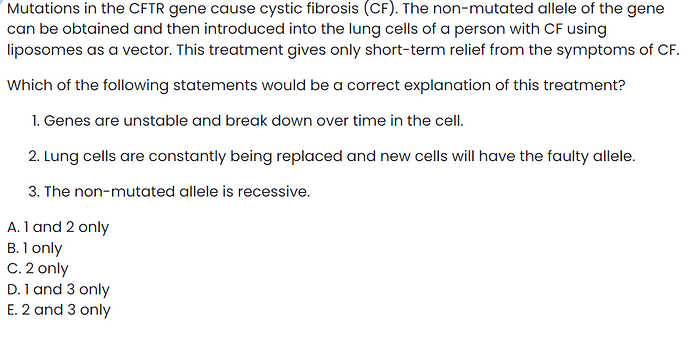hey, can someone explain why 3rd statement is incorrect? i thought along with mitosis constantly taking place and new cells having a faulty allele, if the added non mutated allele were recessive that would also cause it to be ‘only a short term relief’
hi!
i don’t know about the details but the main reason why 3 is incorrect is that the question does not mention whether the CFTR is dominant or recessive
so we cannot assume that it is either one
yea that makes sense, ig its a big assumption to make, thanks!
It’s also because they’re asking the explanation of the treatment and if it’s recessive or not, it doesn’t affect the explanation of the results as there is no link made as Nihan mentioned :))
Hey what is the correct answer ? Is it A?
CF fibrosis is a common topic on the IMAT or any other related exams, so this may be some important background knowledge to know that it is an autosomal recessive disease.
Regardless though, we need to know what the question is asking. It wants us to give the reasons why this treatment is only a short-term solution, making 3 irrelevant. Regardless of what the non-mutated and the mutated allele are (either dominant or recessive), it would not explain why this treatment is short-term.
This is why we cannot say the answer is 3, because it does not answer what is being asked.
The answer is C.
Genes must be stable due to their delicacy. Think about it, we have over 20 000 different genes that vary in individuals. On top of that, they need to be passed down from generation to generation, and regularly replicated to replace damaged or dying cells. If genes were not stable, they would be unlikely to undergo such complicated procedures.
Thank you ![]()
I was thinking maybe the synthetic gene therapy could be exhibiting different stability than a normal case
